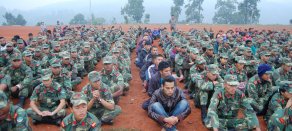
Regrouping of ex-combatants in Nepal. Photo: Chiranjibi Bhandari
The Potentials of Changing Gender Patterns.
Both genders – female and male – can be actors as well as victims in armed conflict, depending on the context.
Changed gender roles among ex-combatants of armed groups constitute a potential source of change towards more balanced gender relations in the larger post-conflict society.
It is necessary to take into account the particular needs of victims of armed conflict, but it is equally important to bear in mind that female and male conflict actors also represent resources that bring their new skills and experiences into the post-conflict situation.
- Changing gender roles during armed conflict can be an asset in a post-conflict situation.
- Skills acquired by female and male ex-combatants during conflict should be documented and acknowledged during the DDR process for constructive use in peacetime.
- Family ties constitute a pull factor of male demobilization and should be actively used in efforts to change violent models of masculinity.
- Soldiers of both genders with a long history in an armed group tend to develop a common identity and to benefit from reintegration programs that allow them to stay together in post-conflict communities.
Read more in a recent policy brief from the PRIO Centre on Gender, Peace and Security.